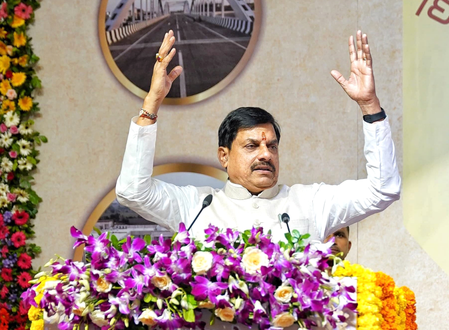

Bhopal, Sep 15 (IANS) Madhya Pradesh Chief Minister Mohan Yadav responded to the Supreme Court’s decision on the provisions of the Waqf (Amendment) Act, stating that the judgment has cleared the way for the beginning of yet another social reform in the country.
Chief Minister Yadav said that with the court’s judgment has also come a response to those who were questioning Prime Minister Narendra Modi’s intention when the Waqf (Amendment) Bill was passed in Parliament.
“The Supreme Court has pronounced its judgment, which has cleared the way for its implementation. People of the country have full faith in Prime Minister Modi that this law will be implemented across the country,” Yadav said talking to media persons in Bhopal.
Cabinet Minister in Madhya Pradesh Government, Vishvas Sarang claimed that the Bill was opposed by those who had misused the Waqf’s properties for this own benefit.
Speaking specifically about the Waqf’s properties in Madhya Pradesh, the BJP minister alleged that a group of Muslim leaders, who have encroached on the Waqf Board’s land and constructed buildings, were trying to mislead the people from the minority community.
“Most of the big Muslim leaders have encroached and constructed buildings on Waqf Board properties, and now they are misleading the poor people from their own community through wrong interpretation of the Waqf Act,” Sarang told IANS on Monday.
He was indirectly referring to Congress MLA Arif Masood, a key leader from the Muslim community in Madhya Pradesh, who not only opposed the Bill and organised protests in Bhopal, but has also filed a petition in the Supreme Court.
The Supreme Court on Monday upheld the Centre’s provisions made in the Waqf Amendment Act, 2025 while also stalling some key provisions of the Act, including the clause that only a practising Muslim of five years can dedicate a property as Waqf.
The Supreme Court declined to stay the Waqf (Amendment) Act, 2025 in its entirety, observing that a statute carries a presumption of constitutionality and can be stayed only in the rarest case.
However, a Bench of Chief Justice of India (CJI) B.R. Gavai and Justice A.G. Masih stayed the provision mandating five years of practising Islam for the creation of Waqf until relevant rules are framed.
Further, the CJI Gavai-led Bench stayed the provision empowering a designated officer to decide disputes on whether a Waqf property has encroached upon government land, observing that an executive officer cannot adjudicate on citizens’ property rights, as this would violate the principle of separation of powers.
“Till adjudication happens by the tribunal, no third-party rights can be created against any parties,” it said.
In its interim order, the apex court directed that state Waqf Boards should have no more than three non-Muslim members, while the Central Waqf Board will not have more than four non-Muslim members.
The Bench also refused to stay the mandatory registration of Waqf properties, noting that the requirement had existed under earlier enactments as well.
–IANS
pd/rad
